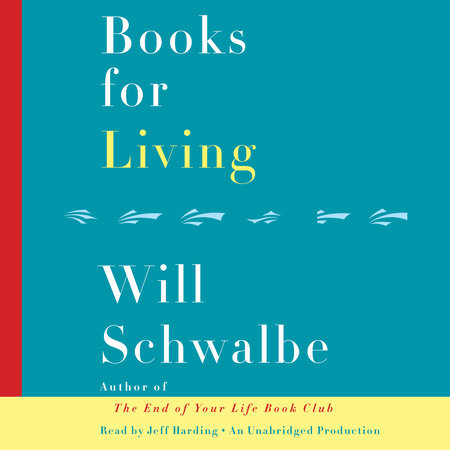Books for Living Reader’s Guide
By Will Schwalbe


1. Discuss the significance of the George R. R. Martin epigraph that opens Books for Living. How does it set the tone for the book?
2. In the introduction to the book, Schwalbe discusses the Internet’s limitations in helping to answer the big questions: “the problem of pain, meaning, purpose, happiness.” How does Schwalbe’s discussion of modern-day living and technology act as a structuring element throughout Books for Living? Discuss the message of “slowing down” and savoring the printed word (and life itself) that Schwalbe champions. Did this message resonate with you?
3. On page 7, Schwalbe points out how reading has a tremendous influence on a person’s worldview and how “every book changes your life.” Do you agree with this assertion? What books have quietly changed your life? Which books immediately announced themselves as significant to you? How do books that you’ve found to be less-than-enjoyable end up shaping you?
4. Lin Yutang’s The Importance of Living is a seminal text for the author and is mentioned frequently throughout the book. Discuss Yutang’s “radical rejection of the philosophy of ambition.” How does the concept of idleness run contrary to the American value system? After reading this chapter, were you inspired to change any of your habits?
5. In “Searching,” Schwalbe discusses his appreciation for Stuart Little after rereading it as an adult. Have you ever returned to a book from your childhood or adolescence? If so, how did your feelings toward the book evolve? Did it gain new meaning for you?
6. Discuss the idea of trust in relation to a book’s narration, per Schwalbe’s discussion of The Girl on the Train. What books have twisted your expectations because of narrative voice or voices? How does the idea of the “unreliable narrator” reflect greater truths about the subjectivity of human experience?
7. In “Connecting,” Schwalbe discusses how Miss Locke, his high school librarian, helped to shape his identity by introducing him to James Baldwin and other masters of literature. Who in your life opened the door for you to discover influential writers and works? Have you ever been able to thank this person for doing that?
8. On page 83, Schwalbe discusses the feeling of tremendous sadness that came over him after finishing David Copperfield as a teen, “mostly because I was going to miss these characters so much.” Which books have elicited a reaction of sadness after its conclusion? What characters have jumped off the page for you, become intimately familiar? Does the act of rereading these books provide comfort to you?
9. The idea of reading as a way to combat grief is a seminal theme in Books for Living, particularly in Schwalbe’s discussion of his friend David Baer. Is there a book that has provided comfort for you in a particularly dark time?
10. Discuss the concept of “vertical thinking” versus “lateral thinking.” How would you identify yourself? How do books, and the act of reading, innately provide the reader with the opportunity to become more lateral thinkers?
11. In Anne Morrow Lindberg’s Gift from the Sea, she emphasizes the importance of spending time alone, particularly for women. Do you share this point of view? How does modern-day living and our constant interaction with technology inhibit us from solitude? When was the last time you conscientiously “disconnected” and spent time by yourself?
12. On page 122, Schwalbe quotes the cookbook author Nigella Lawson, who asserts that “food marks a connection between the living.” Explore this statement. How does cooking and sharing meals together shape our humanity? How did Edna Lewis’s work emphasize the connection between cooking and community?
13. In the discussion of Bartleby, the Scrivener, Schwalbe discusses the “radical” nature of the character, asserting that his radicalness is not the result of the fact “that he refuses to do what’s asked of him; it’s that he refuses to give a reason.” Consider all the times in which you have quit a pursuit. What feelings have you associated with that experience? Were you able to adhere to the principle of “passive resistance,” or did you find yourself feeling obligated, or even guilty, because of the act of quitting?
14. In “Mastering the Art of Reading,” Schwalbe describes reading as a “communion” with the book, achieving perfect harmony when you forget the self and are completely immersed in the book’s pages. How did Zen in the Art of Archery reveal surprising truths about the meditative act of reading for Schwalbe?
15. Which of the books featured in Books for Living have you read, if any? If you have, did you experience any connections to the text that were similar to the author’s? How did reading this book help re-contextualize them for you? Are there any you want to revisit with fresh eyes? If you haven’t encountered any of these titles, which are you inspired to read?
Just for joining you’ll get personalized recommendations on your dashboard daily and features only for members.
Find Out More Join Now Sign In